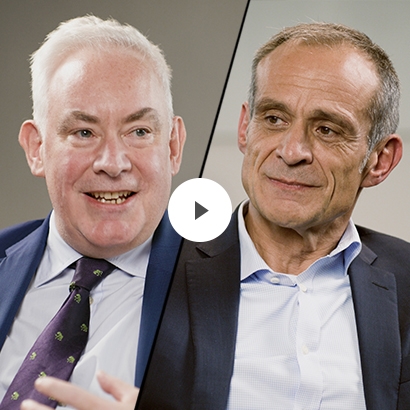The latest research from Child Mind Institute, supported by Morgan Stanley, shows parents find both pros and cons to the increase in internet usage that came about during the COVID-19 crisis.
Morgan Stanley launched its Alliance for Children’s Mental Health (Alliance) in early 2020, leveraging the expertise of leading nonprofits, including Child Mind Institute, and the resources and reach of Morgan Stanley to address the urgent and far-reaching challenges of stress, anxiety and depression in children and young adults. The COVID-19 pandemic hit soon after, causing a substantial rise in the number of young people grappling with mental illness. The pandemic also drove an uptick in internet use, as children were forced to attend school virtually and socialize online with friends they could no longer see in person.
How has that ongoing increase in screentime affected children and families, and how do parents feel about the changes? To find out, Morgan Stanley sponsored a study by Alliance partner Child Mind Institute. The results showed that while there are certainly concerns among parents, there are also perceived benefits to more time spent online, including more family connectedness.
Identifying Parents’ Concerns
The first data point uncovered was not surprising: Screentime is a huge part of our daily lives. A quarter (26%) of parents polled report using the internet six or more hours a day. That number rises to 37% when asked about their children’s habits. And 59% of parents responded that they have become more permissive about internet use during the pandemic.
That’s not to say that they don’t have concerns. According to survey results, the vast majority of parents are aware of the risks associated with internet use. Three-quarters (77%) of respondents agreed that children can be addicted to the internet, and more than twice as many parents (22%) are worried exclusively about their children and internet addiction as are worried about substance addiction (10%). One-third (34%) are equally worried about internet addiction and substance addiction.
In addition to the potential of internet addiction, the survey revealed that:
- 53% of parents are concerned about online bullying
- 67% of parents are concerned about the content available to their children on the internet; and
- 32% of parents often feel distracted by the internet while spending time with their children
About half of parents polled also expressed concern over the impact of internet use on cognitive, social and emotional development. That said, the majority of parents believe their children can use the internet responsibly (73%) and feel comfortable talking about internet use with their kids (82%).
The Benefits and Drawbacks of Family Internet Use
Indeed, the survey shows that parents’ overall attitudes tend to be optimistic about the impact of increased screentime on their families. Almost half (46%) of parents said the internet increases connectedness within their own nuclear families, while 22% of parents disagreed. An even larger group (56%) reported that the internet increases connectedness with their extended families. When asked specifically about how the internet positively impacts connectedness, a majority of parents said it helped them share positive experiences and be more flexible in their ability to schedule time together.
But the study also confirms findings from previous Child Mind Institute research on increased screentime during the pandemic and its effects on children: the behaviors that parents model may play a role in problematic internet usage (PIU) patterns among children. Specifically, PIU patterns among parents were significantly associated with PIU patterns in their children. Additionally, researchers found that negative parenting practices like inconsistent discipline and poor supervision are particularly correlated with PIU in children; and that poor co-parenting (like high levels of conflict or distrust between co-parents) is associated with higher levels of PIU among parents and children and lower levels of concern among parents about the impact of internet use. Strikingly, the effect of parent PIU on their children’s internet behavior was significant even among parents who didn’t report negative parenting practices. Overall, these findings suggest that a simple and potentially effective way to prevent PIU in children is for parents to look at their own internet behaviors.
Conclusion
This survey shows that, in general, the average American family does not see itself in crisis over internet use—but many parents do have real concerns. It is important that parents feel confident about talking to their children about the internet, and the survey suggests several strategies they can use to encourage healthy use. Among them:
- Address concerns about internet addiction: Be open with kids about your concerns and what the data show. PIU is associated with many negative effects. Clear parental expectations are necessary to guide child behavior in order to avoid those outcomes.
- Be honest about your own internet use: Trying to hide your screentime from your children may encourage them to do the same. Similarly, modeling healthy habits—while owning up to and showing how to avoid less healthy ones—is important. In fact, this is one behavior you can control that potentially has significant impact on your child’s internet use.
- Foreground family connectedness: Responsible internet use can have huge benefits as far as bringing family—including extended family—together. As long as there are common-sense rules in place, the internet can be a great way for children to engage and connect in positive ways.
Morgan Stanley is committed to addressing the children’s mental health crisis through its Alliance for Children’s Mental Health. By supporting the work of the Alliance’s nonprofit partners, including research critical to identifying and targeting solutions to the issues of anxiety, depression and stress in young people, the Alliance seeks to develop innovative approaches, drive impact and effect systemic change.
About the Survey
The survey, conducted through research firm Ipsos, reached a nationally representative population of 1,005 U.S. parents with children ages 9-15 and was fielded from July 21st through August 17th, 2022. It asked parents about their attitudes towards internet use, family usage patterns and potential risks that may contribute to problematic internet use (PIU) in children, which is defined as internet use habits that negatively impact their quality of life. Collaborators include Child Mind Institute research scientists Michel P. Milham, MD, PhD and Giovanni Salum, MD, PhD; and Kathleen Ries Merikangas, PhD, and Kevin Conway, PhD, from the National Institute on Mental Health (NIMH). (Drs. Conway and Merikangas were funded by the Intramural Research Program of the National Institutes of Health. This this work does reflect the opinions of the NIMH. )
The survey is the latest Child Mind Institute work examining the internet and associated pandemic impacts on families, work supported by Morgan Stanley. Previous research includes the Coronavirus Health and Impact Survey (CRISIS), a Study of PIU Utilizing the Child Mind Institute’s Healthy Brain Network.



